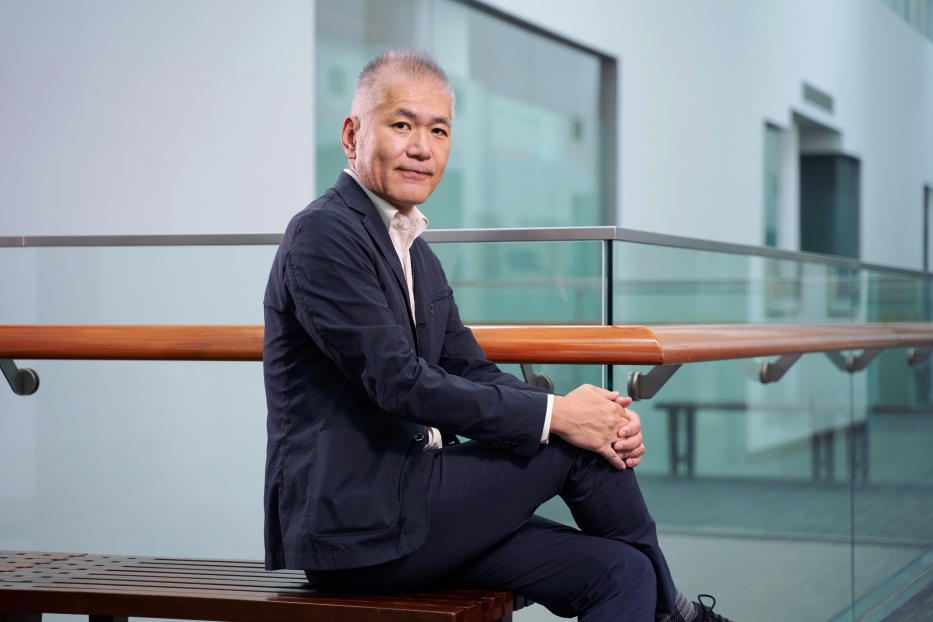Prof Atsushi Kajii

Feature on Atsushi Kajii, Visiting Professor of Economics
School of Economics, Singapore Management University
Finding sunspots & how our expectations can shape economic futures
It’s not just our actions that can have an impact on the real world. Professor Atsushi Kajii’s research focuses on sunspots, exploring the key role of human expectations about the future, and how they can shape economic realities.
Suppose you're living on a harmonious, peaceful island, where everyone grows crops as they wish, and then sells or exchanges these products.
One day, for some reason, people on the island start to worry about how the future prices of their crops might fluctuate. Even though such concerns have no basis, these thoughts may start to influence their farming activities. What could happen is that as people start reducing the amount of crops they plant, and the prices indeed start to shift.
“As it turns out, our expectations of future scenarios do have an impact on the real world,” says Atsushi Kajii, Visiting Professor of Economics at Singapore Management University. “You might then say, ‘So I was right!’ But in reality, this is a self-fulfilling prophecy.”
The above-described phenomenon can be encapsulated in the economic concept of sunspots, which is Kajii’s key research area. “It is the idea that arbitrary changes in expectations might influence the economy,” he explains.
In economics, a sunspot refers to an extrinsic random variable; that is, a random variable that does not affect economic fundamentals – such as endowments, preferences, or technology. The whimsical name was coined by a 19th-century economist William Stanley Jevons, who attempted to correlate business cycle patterns with sunspot counts on the actual sun. This was on the grounds that they might cause variations in weather and thus affect agricultural output. While the sun does indeed influence agricultural production, subsequent studies have found no evidence for the hypothesis that the sunspots influence the business cycle.
Theory of labour to theory of value
Kajii shares that he stumbled upon his field of research – economic theory – by chance. In college, he had studied Marxism. One fateful day, he was looking for resources on the Marxist theory of labour and discovered a thin book titled “The Theory of Value”. “Judging by the number of pages, I thought it would be a quick way for me to understand the Marxist concept of labour value theory. As it turns out, it was on mathematical economics.” He was intrigued by the book, and the rest was history.
Kajii says economic theories aim to understand the foundation of economics, and how economics work, or should work. “We are not very practical people, because I wouldn’t be able to tell you which financial asset you should put your money into,” he jokes. “Rather, my field of work provides the fundamental idea of how we should think, and benchmarks ideas that would be augmented by real-world analysis. For example, we explore the general value of allocating money to various financial instruments. Why is it a good idea to invest? What’s the basis of having a public policy on vaccinations? These are some areas that we seek to answer.”
One of the major questions in mathematical economics is how markets work, and researchers often use sophisticated mathematical models to study it. Kajii explains that this is because language can be biased, while mathematics is consistent and objective, thereby allowing the mathematical model to be applied to a wide range of topics.
Kajii’s most cited paper, titled “The robustness of equilibria to incomplete information”, is on game theory, which is a theoretical framework for conceiving social situations and strategic interactions among rational agents. “Suppose you're a researcher in an environment in which people understand and interact with one another, but as an outsider, you wouldn’t know the details of these individuals’ wellbeing. This means that you have limited information about these people, and therefore, your prediction and your model is not perfectly accurate,” he says.
However, Kajii elaborates, the key question is whether you are able to come up with a prediction that is robust enough, such that the missing or unknown information doesn't mess up your prediction or forecast completely.
What AI cannot replace
With the recent advancements in technology, many businesses across all sectors are leveraging artificial intelligence (AI) for a wide range of use cases, from speech recognition and image classification, to genomics and drug discovery, and even forecasting and prediction. On whether such digital tools would be useful in his area of research, Kajii believes that it is unlikely AI can replace the role of economic theorists.
He raised the example of AlphaGo developed by Google, which was the first computer programme to defeat a professional human Go player, as well as a Go world champion. The new version of AlphaGo, called AlphaGo Zero, was even more revolutionary. Kajii explains, “AlphaGo studied all human records, which means that it evolved over human ideas to eventually win human players at the game. But AlphaGo Zero was told only the rules of the game and it figured out how to win on its own.”
However, the tricky thing is that AlphaGo Zero cannot itself explain why it’s so strong. Kajii says, “Even though AI will replace the human instinct, or tasks that we learn through experiences and rules, they are not able to replace theories or philosophy.”
He concludes, “Be it economics or mathematics, or in any other disciplines, humans will always be much better at theorising than AI. Perhaps in future there can be a division of labour in which human beings focus on philosophising, while AI can be used to lessen the years of experience required to learn or do a task.”